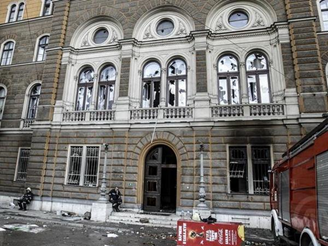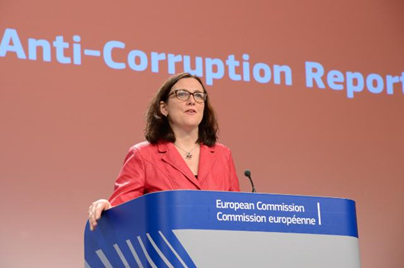Bosnia as Wunderkind – Corruption from Kosovo to Germany
 |
 |
|
|
Ugly ducklings, fairy tales and Bosnia in 2015 |
||
Dear friends,
A few months ago we wrote about the annual World Bank Doing Business report: Pumpkins, outliers and the Doing Business illusion.
We analysed two striking stories: how Georgia overtook Germany in 2007 and remained ahead of Germany year after year in the World Bank's Doing Business rankings. And how Macedonia managed to beat Switzerland in the same rankings. We concluded that:
"Unexpected success stories reinforce the World Bank's message that if any country follows concrete prescriptions it will achieve amazing results. It is the promise of fairy tales: the ugly duckling turns into a beautiful white swan, giving hope to all ugly ducklings in this world."
This week we need to go one step further: it is time for Bosnia to become a white swan.
 |
|
|
A little magic needed |
|
Doing business and a Bosnian fairy tale
For all its flaws, Doing Business is not going away. In fact, this ranking has just become even more important for Bosnia and Herzegovina. In its conclusions this week the European Council of the EU wrote:
"Meaningful progress on the implementation of the agenda for reforms, including the 'Compact for Growth and Jobs', will be necessary for a membership application to be considered by the European Union."
The Compact for Growth and Jobs has six conditions, and one of these six is about Doing Business:
"Bosnia and Herzegovina needs to boost competitiveness by approving a results-based plan aimed at improving the conditions measured by Doing Business indicators to match the regional average."
Thus, progress on Doing Business has become a new condition for an EU membership application to even be considered. One might ask whether this makes any sense. Or one might turn to transforming Bosnia into a new Macedonia-like-doing-business-success-story instead.
Letter to the Presidency
 |
|
|
Talking about a Compact … |
|
In a letter to the Bosnian presidency this week we write:
"Today, according to the World Bank, Bosnia is the worst place in Europe for business. This is not a good reputation to have.
The most recent World Bank Ease of Doing Business report ranked 189 countries. Singapore came first, Eritrea came last and Bosnia came in 107 position. This implies that it is more difficult to do business in Bosnia than in Kosovo (75), Azerbaijan (80) or in Ukraine (96), which is at war.
In this letter we would like to suggest how to change this situation within a very short period of time and without a huge effort. We carefully studied the astonishing rise in the Doing Business rankings by Georgia and Macedonia. Here we outline how within one year Bosnia can reach a better rank than the Balkan average; and it will help you understand how within another year Bosnia could overtake the EU."
Attached to our letter is a detailed outline of fourteen concrete steps:
Bosnia as Wunderkind of Doing Business
Outline 14 of steps to take
These steps are easy to take. They might, unfortunately, not lead to many new jobs:
"We can advise you on how to improve Bosnia's ranking within one year. We do not promise that this will actually lead to more jobs or investment. And yet, it is time for some surprising good news from Bosnia."
Thus, without spending any more money on consultants Bosnia can become the next white swan … following in the footsteps of Georgia and Macedonia. It is about time.
A powerful tool to measure corruption
 |
|
|
Presenting a new instrument in 2014 |
|
Every year in its annual progress reports the European Commission discusses corruption in all seven accession countries. It notes that even the best laws, the shiniest anti-corruption agencies and the longest anti-corruption action plans are only means to an end. The end of anti-corruption policies should be impact and measurable results.
But can the incidence of corruption in different walks of social life be fairly established? Can the impact of anti-corruption reforms be measured? In a new discussion paper we argue that the European Commission has a very powerful tool at its disposal which has not yet been used with the accession countries:
Measuring corruption
The case for deep analysis and
a simple proposal
Between 2011 and 2014 the European Commission invested serious resources to develop a sound methodology to measure corruption inside the EU. In 2011, the European Commission noted that "existing international monitoring and evaluation mechanisms" were limited. It added:
"EU Member States have in place most of the necessary legal instruments and institutions to prevent and fight corruption. However … anti-corruption rules are not always vigorously enforced, systemic problems are not tackled effectively enough and the relevant institutions do not always have sufficient capacity to enforce the rules. Declared intentions are still too distant from concrete results."
In February 2014, it published Special Eurobarometer 397 – Corruption covering all 28 EU member states. At the same time it released a survey on corruption geared towards the EU's business world, Flash Eurobarometer 374 – Business' attitudes towards corruption in the EU.
These surveys became the key input into the 2014 EU Anti-Corruption Report, based on polling 1,000 individuals and 300 companies in each EU country.
Going forward, the European Commission proposed a regular anti-corruption report to provide objective assessments every two years. This was meant to be a regular publication. In fact, it may cease to exist under the new Commission.
Corruption in Europe: perception and reality
 |
How widespread is corruption? How are anti-corruption campaigns perceived? Here are some of the findings from the EU report for six countries:
How widespread is corruption? (percent)
|
Country |
Widespread |
Rare |
|
Denmark |
20 |
75 |
|
Germany |
59 |
33 |
|
Poland |
82 |
13 |
|
Romania |
93 |
3 |
|
Italy |
97 |
2 |
|
Greece |
99 |
1 |
Note: In ten EU member states more than 90 percent of respondents considered corruption to be widespread! How about the actual experiences of individuals and businesses?
Has anyone asked or expected a bribe from you in past 12 months? (Individuals)
|
Country |
"Victim" of corruption |
|
Romania |
25 |
|
Poland |
15 |
|
Greece |
7 |
|
Italy |
1 |
|
Germany |
1 |
|
Denmark |
1 |
A more nuanced picture emerges. Perception and experience are consistent with each other in Denmark – people there have not experienced corruption and do not believe it is widespread. They also match in Romania, Poland and Greece, where many people believe corruption is widespread and many have experienced it in the past twelve months.
But in the case of both Italy and Germany there is a gap. In both countries clear majorities believe that corruption is widespread. And yet few people in either country have experienced corruption themselves.
However, more detail is needed if one wants to also understand where people have been victims of corruption in the past twelve months. Look at these findings:
Victim of corruption (percent) in the past 12 months in… (percent)
|
Country |
Healthcare |
Police/customs |
|
Romania |
22 |
2 |
|
Poland |
8 |
2 |
|
Greece |
6 |
0 |
|
Italy |
1 |
0 |
|
Germany |
0 |
0 |
|
Denmark |
0 |
0 |
Such findings have obvious policy and reform implications. So do the findings of the business survey:
Is corruption a problem for your business? (percent)
|
Country |
No |
Yes |
|
Denmark |
94 |
4 |
|
Germany |
76 |
22 |
|
Poland |
67 |
32 |
|
Italy |
51 |
49 |
|
Romania |
34 |
65 |
|
Greece |
34 |
66 |
Corruption is a very serious problem for businesses in Romania and Greece. But there is also a wide gap between Denmark and Germany, where 22 percent of businesses say corruption is a problem.
In what areas do businesses encounter corruption? Businesses have different problems in different countries. In Greece more than 3 percent of businesses have problems with building permits and vehicle permits and environmental permits; the same is true in Poland and the Czech Republic.
Such surveys help by providing a focus for national debates on corruption. They make comparisons fair. They are an essential complement to existing analysis.
Perception – where Kosovo beats Germany
 |
 |
The most widely cited corruption ranking – the annual Transparency International Corruption Perceptions Index (CPI) – has done what its title promises since 1994, which is to measure perceptions.
To see why perception is a useful, but never sufficient, indicator, consider the results of the most recent Transparency International Global Corruption Barometer and the national results presented on the Transparency International country pages, and see how people in three countries – Turkey, Kosovo, Germany – feel about corruption in key institutions.
"Percentage who felt these institutions were corrupt/extremely corrupt 2013 (percent)
|
Institution |
Turkey |
Kosovo |
Germany |
|
Political Parties |
66 |
75 |
65 |
|
Parliament/legislature |
55 |
66 |
48 |
|
Military |
30 |
8 |
25 |
|
NGOs |
34 |
20 |
31 |
|
Media |
56 |
34 |
54 |
|
Religious bodies |
41 |
17 |
34 |
|
Business |
50 |
52 |
61 |
|
Education systems |
42 |
47 |
19 |
|
Judiciary |
43 |
80 |
20 |
|
Medical and health services |
43 |
70 |
48 |
|
Police |
38 |
39 |
20 |
|
Public officials and civil servants |
42 |
44 |
49 |
There are many surprises here. Political parties are perceived as similarly corrupt in both Turkey and Germany. The German military is perceived as significantly more corrupt than the Kosovo Security Forces. The same is true for German NGOs and religious bodies compared to those in Kosovo. Finally, when it comes to the perception of corruption among public officials, both Turkey and Kosovo rank better than Germany.
Perceptions can highlight a problem. But they are dangerous and misleading when they are not qualified by other sources of information. Certainly, perceptions are not a good basis for plans of action.
What is needed is deeper analysis of what exactly is wrong and a credible tool to track performance. The 2014 EU Anti-Corruption Report has provided this for the EU member states. This is also needed in the accession countries today.
A plea: do not let this anti-corruption effort die
The EU Anti-Corruption Report, meant to be a regular biennial publication, may cease to exist under the new Commission.
We hope this decision will be reconsidered and there will be another report soon, then including all seven accession countries. The Commission's investment in developing a sound methodology has been made: these are sunk costs. It would be a terrible waste, and a lost opportunity, not to put this to use going forward.
What is needed in discussions of corruption in the Balkans and Turkey is depth, not shallowness, and statements based on serious analysis, not preconceptions. The European Commission has the tool to ensure this. It only has to use it.
If corruption is serious business, its assessment should be as well.
Yours sincerely,

Gerald Knaus
- ESI letter to the Bosnian presidency - 14 stops to Bosnian business miracle – NEW
- ESI discussion paper - Measuring corruption - the case for deep analysis – NEW
- EU Anti-Corruption Report (2014)
- Special Eurobarometer 397 – Corruption (2014)
- Flash Eurobarometer 374 – Business' attitudes towards corruption in the EU (2014)
- Transparency International 2013 Global Corruption Barometer country sections: Germany, Greece, Italy, Kosovo, Turkey
- Ivan Krastev, Shifting Obsessions, CEU Press, 2004
- ESI essay: The good news from Greece – Can Thessaloniki point the way? (February 2015)
- ESI essay: Transition and happiness – a Bulgarian paradox? (December 2014)
- ESI report: Protests and Illusions – How Bosnia and Herzegovina lost a decade (23 December 2014)
- Rumeli Observer: Enlargement 2.0 – The ESI Roadmap Proposal (Belgrade presentation) (27 November 2014)
